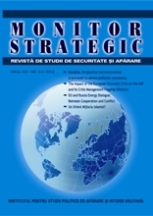QUAD – emergența unei coaliții de voință și reacțiile factorilor de decizie de la Beijing
QUAD - the emergence of a coalition of willing and the reactions of decision makers in Beijing
Author(s): Șerban Filip CioculescuSubject(s): Security and defense, Transformation Period (1990 - 2010), Present Times (2010 - today), Geopolitics, Peace and Conflict Studies
Published by: Editura Militară
Keywords: China; US; alliances; partnerships; competition; containment; Indo-Pacific; conflict; negotiation;
Summary/Abstract: Since 2007, there is an Asia-Pacific cooperation security format, called the Quadrilateral Security Dialogue (QSD or QUAD), which is made up of the United States of America, Japan, Australia and India. The idea was launched by former Japanese Prime Minister Shinzo Abe in response to the devastating tsunami that hit South Asian countries in 2004. It was not and is still not a formal alliance, based on firm military guarantees, especially because India, Japan and Australia in general are afraid to openly participate in counterbalancing China’s efforts for regional hegemony, but rather a forum for strategic dialogue and coordination, developed in the years after the great tsumani in 2004 in the Indian Ocean. Chinese decision-makers are irritated by QUAD’s activities and by the fact that India, Australia and Japan seem to have mutually agreed with the Indo-Pacific geopolitical decoupage which is officially used by Washington.
Journal: Monitor Strategic
- Issue Year: 2021
- Issue No: 1-2
- Page Range: 28-38
- Page Count: 11
- Language: Romanian

